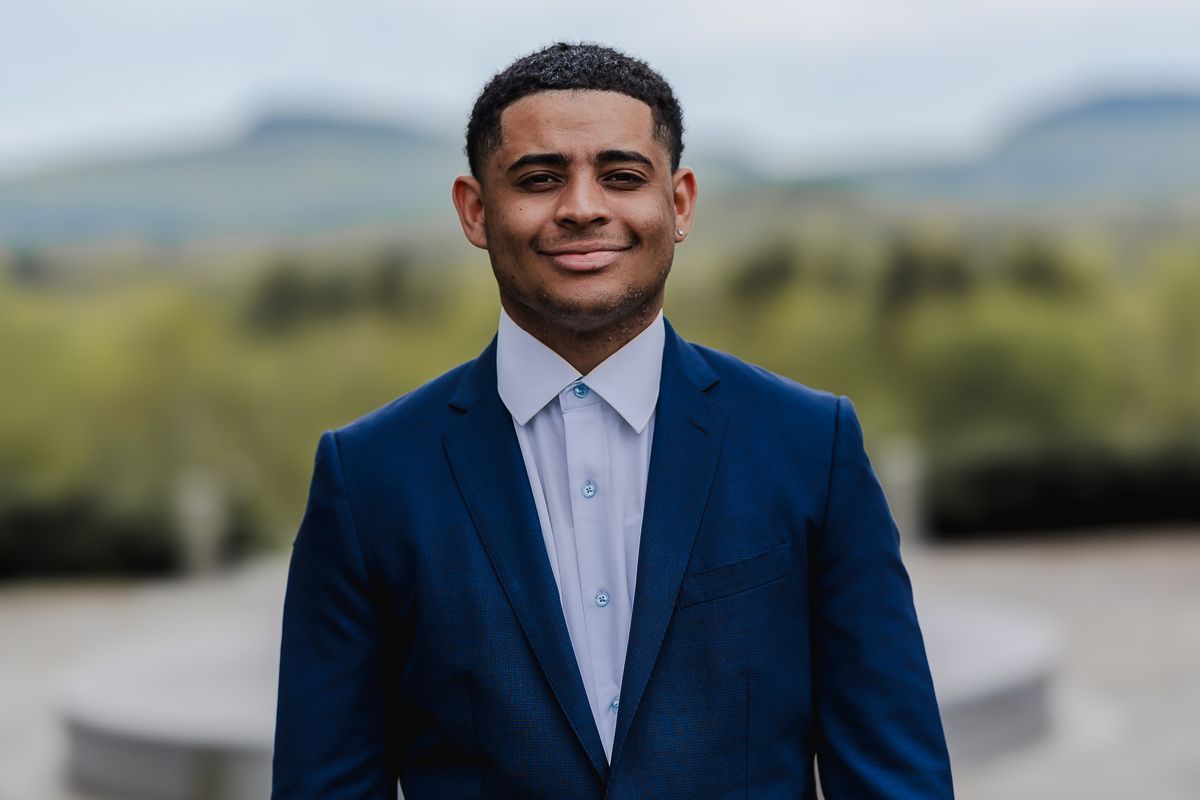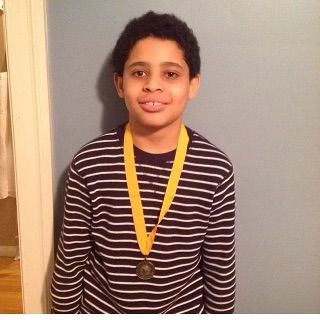Zaki Alaoui: Neuroscience Research Grounded in Growth
Dedicated to his cognitive neuroscience research, Zaki Alaoui’s commitment to self-reflection and exploration has earned him a reputation as a positive force outside the classroom.

Hidden from the hustle and bustle of campus, tucked behind Kirby Theater, lies Zaki Alaoui ’24’s escape from the pressures of daily life at Amherst: the Yushien Japanese Garden. “I was like, what’s here? And I just went down,” he said, remembering his discovery of the garden his freshman year. For Alaoui, it’s another world: a place to meditate, to “think within himself” or converse for hours with friends, to remark on the history of cultural exchange at Amherst, and to just be himself before climbing back up the steps and rejoining the fray. Alaoui’s reflections in the garden serve as a microcosm for his time at Amherst — a time filled with curiosity about his own mind and the minds of others, and alongside that curiosity, a commitment to personal growth.
Your Average ADHD Kid
Alaoui was born and raised in Boston, Massachusetts. But he also places his upbringing at Milton Academy, a K-12 school just outside Boston, which he attended beginning at four months old all the way through the end of high school.
“It was my entire life growing up,” he said. “I’ve always loved school.”
That love stemmed from his parents: Alaoui’s mother is an educator who enrolled him in Milton’s preschool while she worked there, and both parents encouraged him to explore his academic interests, no matter where they might lie. Throughout college, Alaoui has remained close to the classmates and faculty he met at Milton, continuing to work as the class agent and returning to use the gym.
Despite his love for education and close ties to the community, Alaoui didn’t always fit into the classroom. He described his second-grade self as “your average ADHD little kid”, and remembered teachers berating him for talking too fast and blurting things out before they called on him. At recess, friends reciprocated his high energy, but they seemed able to transition back to the more structured classroom environment as easily as flipping a switch. Reigning in his energy proved far more difficult for Alaoui, and his test scores reflected that. Alaoui was eventually diagnosed with ADHD, but his dad questioned whether the medication he was prescribed was actually needed — and as he grew older, so did Alaoui.
“Okay, I’m different in my behavior but, obviously, why?” he recalled himself wondering in middle school. He was a “science kid” and eventually realized that “there’s a field that was the systematic study of the brain, which led to my first neuroscience class in my senior year of high school at Milton Academy, and I knew I was going to do neuroscience.”
As the first institution to offer an undergraduate major in neuroscience, Amherst had both a strong program and everything else he wanted in a college: an open curriculum that gave him the space to pursue his interests, small class sizes that fostered genuine connections, and caring professors. College students, on average, switch their major 2 to 3 times in the course of four years. Despite the demanding requirements of the major, Alaoui truly couldn’t imagine studying or researching anything else.

Diving Into Research
Coming to Amherst during the height of Covid wasn’t what Alaoui imagined for his first year in college.
“Freshman year was a joke here,” he said, laughing. “Everything was online, I took three classes. I would literally be in the Science Center hanging out half the day.”
That didn’t stop Alaoui from diving into academics, however. During the summer after his first year, he participated in the STEM Incubator program. The experience solidified his interest in research. The following fall, he began working in a molecular biology lab.
“I actually realized that I hate working with fruit flies. They’re just annoying, so I’m just never going to do that again,” he said dryly. “It was really good to learn the consistency of what a lab is like, but I knew going forward that I wanted to work with humans.”
The summer after his sophomore year, Alaoui received the Kauffman Summer Fellowship in Biomedical Research and used the funding to study Batten’s disease, schizophrenia, and autism at Boston Children’s Hospital. Joining a much larger lab allowed him to develop as a researcher in a way he wouldn’t be able to at Amherst: he learned molecular genetic techniques and worked directly with frozen human brains.
His research experiences and time spent studying abroad not only enabled him to pursue the interest in understanding the human mind that had led him to Amherst, but they also pushed him to define what exactly about the field mattered to him.
Alaoui ultimately chose not to double major in neuroscience and psychology, but focused his time studying abroad in the Netherlands on classes at the intersection of neuroscience and cognitive psychology. “I took a lot of learning and memory [classes]. I took a consciousness course, a class about perception,” Alaoui said. “That’s when I really knew that cognitive neuroscience is what I want to do,”
Community
Even with his dedication to his academics, Alaoui has prioritized seeing Amherst beyond the lab’s confines. He’s found solace and joy in activities that allowed him to explore nature, challenge himself physically, and connect with communities that mirrored his diverse upbringing.
Part of the “transformative experience” Alaoui describes at Milton was its diversity, a melting pot that prepared him for his time at Amherst and for his work mentoring younger neuroscience students alongside connecting with prospective students as a Diversity Outreach Intern.
At Amherst, he’s pursued weightlifting, biking, and birdwatching. “I really like birds. I don’t know why,” he admitted. “I can‘t wait to be like an old retiree just sitting on my porch listening to birds.”
During his time in the Netherlands, he developed a love for biking. He has continued this hobby at Amherst, where he enjoys exploring the rail trail.
Amidst these pursuits, Alaoui found a sense of community on the rugby team. Playing on a college team echoes back to his childhood love for baseball, which he gravitated toward despite his Moroccan dad’s preference for him to play soccer: “I actually showed him how to play, and it was really funny,” Alaoui said. “He was like, ‘why can’t they go the other way to the base?’”
Transitioning to Amherst, and being isolated from people during some periods of freshman year helped Alaoui to understand aspects of himself he may have not explored otherwise. He grew close to the Muslim Students Association during his first Ramadan on campus.
“Being part of a supportive community during Covid allowed me to delve deeper into my identity as a Muslim and, in turn, as a person,” he reflected, smiling. Alaoui now identifies as “totally Muslim,” but remembers his mixed religious upbringing fondly.
“My parents had a very healthy understanding of each others’ religion,” he reminisced, “I definitely had a lot of celebrations in the house.”
Thesis Work
Alaoui began his work on his senior thesis the summer after his junior year. He was particularly excited about being supervised by Assistant Professor of Psychology Michael Cohen. He admired Cohen’s research on consciousness, and joining his lab had been a goal of Alaoui’s since his first year as a neuroscience student. Inspired by questions about the philosophical aspects of consciousness and subjective experiences, his thesis focused on the impact of our familiarity with a scene on our ability to see color within it, or as he explained it, “the difference between how much we think we see versus how much we actually see.”
According to Alaoui, our visual perception is often inaccurate. We can miss things as obvious as a gorilla walking onto screen, and our color vision extends shorter than our black-and-white vision. To compensate, our brains engage in a phenomena known as “filling in”, where we use prior memories of similar scenes to add in missing information about a scene. In his research, he showed participants familiar and unfamiliar scenes and examined how much further they could see color in, or identify parts of, a scene as a function of their familiarity with it. It turns out, we see much less of the world than we perceive ourselves to.
“Familiarity with the scene actually expands how much of the world we can see,which might be why we feel that we see so much of the world,”Alaoui said.
Life after Amherst
“After knowing Zaki for four years at Amherst, he is someone who loves academia. I don’t know what he would do after Amherst if he wasn’t going to [get] a PhD,” said his friend, Adam Johnson ’24. “Maybe he would be someone that helps younger students on their way to college, definitely something involved in academia.”
Fittingly, Alaoui plans to enter a Ph.D. program after completing a two-year postbaccalaureate research program in neuroscience at Stanford. When discussing his career aspirations, he expressed excitement about more than the research itself. He plans to stay connected with people he has met in college, beginning with his supervisor at Boston Children’s Hospital.
“Now I have a mentor outside of Amherst to have in my corner,” he said, “I got this job through an Amherst alum … it was just so helpful to have the Amherst alum stay in touch. They want to see every Amherst student thrive.”
Reflecting
Looking back on his time at Amherst, Alaoui would say that he has thrived. “I think Amherst’s forced me to grow as a person and understand that [I] can do this,” he shared. “I published my thesis. It’s a very nice accomplishment, and I’m proud of the work that I’ve done. His academic achievements, however, are not the only part of his time at Amherst Alaoui is proud of: “I’m just really happy that I [became] a person I like — that was something I was always nervous about.” He added,“I’ve found some of my best friends here.”





Comments ()